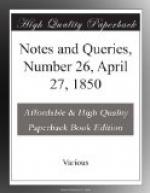“The time has been, my friends, when I myself was no better off than you are; but I gained my present position solely by my own talents (virtute). Wit (corcillum) makes the man—(or, literally, It is wisdom that makes men of us)—everything else is worthless lumber. I buy in the cheapest and sell in the dearest market. But, as I said before, my own shrewdness (frugalitas) made my fortune. I came from Asia no taller than that lamp stand; and used to measure my height against it day by day, and grease my muzzle (rostrum) with oil from the lamp to make a beard come.”
Then follow some additional examples of the youth’s sagacity, not adapted for translation, but equally instances of worldly wisdom. Thus every one of the actions which Trimalchio enumerated as the causes of his prosperity are emanations from the head, not the heart; the results of a crafty intellect, not of moral feeling; so that the sentiment he professes, instead of being similar to, is exactly the reverse of that expressed by Pope.
This explanation seems so satisfactory that we might be well contented to rest here. But some MSS. have the reading coricillum instead of corcillum. If that be received as the genuine one, and some editors prefer it, the interpretation above given will only be slightly modified, but not destroyed, by the introduction of another image, the essential point remaining the same. The insertion of a vowel, i, precludes all connection with cor and its diminutives, but suggests a derivation from [Greek: korukos], dim. [Greek: korukion], a leathern sack or bag, which, when well stuffed, the Greeks used to suspend in the gymnasium, like the pendulum of a clock (as may be seem on a fictile vase), to buffet to and fro with blows of the fist. The stuffed bag will represent the human head on the end of its trunk; and the word may have been a slang one of the day, or coined by the Asiatic Trimalchio, whose general language is filled with provincial patois. The translation would then be, in the familiar style of the original,—“The noddle makes the man,” &c.




